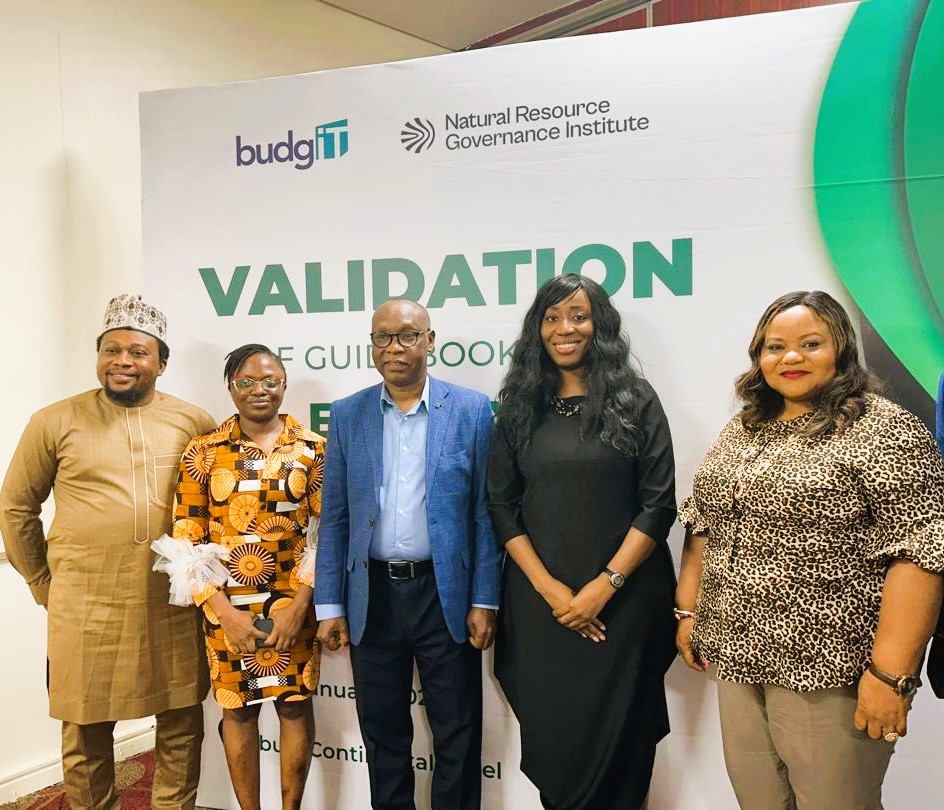NRGI, BudgIT Presents Energy Transition Guidebook For Stakeholders Validation

By Juliet Ukanwosu
The Natural Resources Governance Institute (NRGI) in partnership with BudgIT Foundation, on Wednesday in Abuja, convened a stakeholder’s session for the validation of a Guidebook on Energy Transition in Nigeria.
Senior Officer at the Natural Resource Governance Institute, Nigeria Program, Tengi George-Ikoli, in her opening remarks, stated that the validation session was organized to create an opportunity for relevant stakeholders to review the Guidebook and make valid inputs that could further enhance and enrich the document before its final adoption and use.
She explained that the Energy Transition Handbook is a homegrown document that would be useful to drive a seamless and sustainable energy transition in Nigeria by both the government, civil society and other relevant stakeholders.
While welcoming necessary views and suggestions on the Guidebook during the validation session, George-Ikoli who presented the Guidebook, urged participants to participate robustly, honestly and to air their candid views with a view to further enriching the document.
Executive Secretary of the Nigeria Extractive Industries Transparency Initiative (NEITI), Dr. Orji Ogbonnaya Orji, who participated at the event, commended NRGI and BudgIT for developing the Energy Transition Guidebook, saying it was necessary to provide more contextual explanation to Nigeria’s existing broad Energy Transition Plan (ETP).

Caption: Adejoke Akinbode, Head, Natural Resource Governance and Sustainability, Budgit; Juliet Ukanwosu, Executive Director, Extractive360; Felicia Dairo, Program Manager, CJID, Juliet Eneh, Assistant Program Officer, CISLAC, during the validation session in Abuja
He recalled that NEITI partnered with the NRGI in 2023 to host a National Dialogue on Energy Transition, stating that the Guidebook is one of the fallout of the conference.
Dr. Orji said, “As you are aware Nigeria has a plan on energy transition, but Nigeria’s energy transition plan is a broad policy plan that requires a lot more contextual explanation and definition to cascade it down to who is going to do what. The plan is pregnant with a lot of explanations that needs to be made.”
While explaining that the ETP was done by the last administration, he added that for purposes of continuity in policy implementation, stakeholders have a responsibility to constantly put the discussion on the table so that it continues to gain traction and not get lost.
He emphasized the need for all stakeholders, including relevant government agencies, civil society and the media, to work together and continue to collaborate and communicate in order to close any gap and also for the purpose of having a clear understanding of who is going to do what, for easy implementation.
According to him NEITI already sees a gap in the area of accurate data, that the agency aims to fill. “We already see a gap that we must fill, that gap is on data. How do we provide the requisite data that will be needed to drive the energy transition policy plan, we can’t plan without fact,” Orji said.
Speaking further, he added “We (NEITI) are looking at energy transition in terms of what will be the impact on livelihoods, what will be the impact on job, on the environment, on gender, on inclusion as well as corruption risk assessment.”
In her remarks, Head of Natural Resource Governance & Sustainability Unit at BudgIT Foundation, Adejoke Akinbode, explained that the Guidebook offers perspectives that responds to Nigeria’s unique context and peculiarities as a fossil fuel-dependent nation.
She explained that the guidebook will provide the Nigerian government and citizens with approaches that will help navigate the energy transition, mitigate against transition-led shocks, and strengthen the overall participation and transparency in the transition process.
According to her, the validation session is intended to provide a platform for stakeholders to discuss the approach, findings and recommendations proposed by the Guidebook to strengthen Nigeria’s energy transition to ensure ownership.
“The guidebook is intended to serve as a reference tool for the government and an accountability tool for civil society actors, the media, the public, and international entities. Ensuring the guidebook’s content is fully utilized will require understanding, acceptability and ownership by stakeholders,” Akinbode added.





























